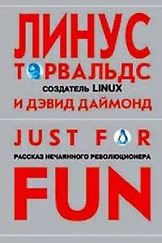Linus Torvalds - Just for Fun
Здесь есть возможность читать онлайн «Linus Torvalds - Just for Fun» весь текст электронной книги совершенно бесплатно (целиком полную версию без сокращений). В некоторых случаях можно слушать аудио, скачать через торрент в формате fb2 и присутствует краткое содержание. Город: NewYork, Год выпуска: 2001, ISBN: 2001, Издательство: HarperCollins Publishers, lnc., Жанр: Программирование, на английском языке. Описание произведения, (предисловие) а так же отзывы посетителей доступны на портале библиотеки ЛибКат.
- Название:Just for Fun
- Автор:
- Издательство:HarperCollins Publishers, lnc.
- Жанр:
- Год:2001
- Город:NewYork
- ISBN:0-06-662072-4
- Рейтинг книги:4 / 5. Голосов: 2
-
Избранное:Добавить в избранное
- Отзывы:
-
Ваша оценка:
- 80
- 1
- 2
- 3
- 4
- 5
Just for Fun: краткое содержание, описание и аннотация
Предлагаем к чтению аннотацию, описание, краткое содержание или предисловие (зависит от того, что написал сам автор книги «Just for Fun»). Если вы не нашли необходимую информацию о книге — напишите в комментариях, мы постараемся отыскать её.
Just for Fun — читать онлайн бесплатно полную книгу (весь текст) целиком
Ниже представлен текст книги, разбитый по страницам. Система сохранения места последней прочитанной страницы, позволяет с удобством читать онлайн бесплатно книгу «Just for Fun», без необходимости каждый раз заново искать на чём Вы остановились. Поставьте закладку, и сможете в любой момент перейти на страницу, на которой закончили чтение.
Интервал:
Закладка:
By the way, I've never felt that I was in the idealistic camp. Sure I've always seen open source as a way of making the world a better place. But more than that, I see it as a way of having fun. That's not very idealistic.
And I have always thought that idealistic people are interesting, but kind of boring and sometimes scary.
In order to hold a very strong opinion, you have to exclude all the other opinions. And that means you have to become unreasonable. This is one of the problems I have with American politics vis-a-vis European politics. In the American version of the game, you draw the enemy lines and the skill rests on one side's ability to be divisive. European politicians tend to win by demonstrating they can foster cooperation.
So I'm stuck with the conciliatory approach. The only time I was ever nervous about commercialism was very early on, when Linux didn't have much of a name. At that point, if commercial people had coopted Linux, there would have been nothing I could do. But that's obviously not the case now. One concern raised in newsgroup flames amid the activity of 1998 was that commercial people wouldn't give anything back. To some extent, I had to trust the new corporate players as much as Linux developers were trusting me. And they proved themselves to be trustworthy. They haven't held back. So far it's been very positive.
As poster boy, holder of the Linux trademark, maintainer of the Linux kernel, I felt a growing sense of responsibility. I felt increasingly responsible for the fact that millions of people now relied on Linux, and immense pressure to make sure it worked as reliably as possible. It was important to me to help corporations understand what open source was all about. There was no war, as far as I was concerned, between the greedy corporations and the altruistic hackers.
No, I wasn't giving up my ideals by meeting with Intel when they asked me to help them deal with the Pentium FO OF lockup bug ("Pentium FO OF bug?" I hear you ask. Yeah, it's us whacky engineers, making up whacky names again. "FO OF" is the hexadecimal representation of the first two bytes of an illegal instruction sequence that made Pentium CPUs lock up. Thus the name). No, it wasn't hypocritical to promote the wonders of open source code while collecting a salary from a company that was so closed it wouldn't even tell people what it was doing. The fact is, I respected, and still do, the low-power chip Transmeta was developing, and I saw it as the most interesting technology project out there -- and the one with the broadest possible implications. And, for the record, I was part of an effort to get the company to release at least some of its code.
I felt pressure to hold my ground within the open source community as someone who could be trusted from both a technology standpoint and an ethical standpoint. It was important to me not to take sides among competing Linux companies. No, I wasn't selling out by accepting stock options that Red Hat was kind enough to offer me as thanks. But it did make sense to turn down the entrepreneur in London who was offering me $10 million just to lend my name to his fledgling Linux company as a board member. He couldn't fathom that I would turn down such a huge amount for such little heavy lifting. It was like, "What part of ten million dollars don't you understand?"
It hadn't occurred to me that I might face such issues. And Linux's newfound popularity brought with it some tricky times not just for me but for the entire virtual community. In fact, as open source code gained the world's attention in 1998, one of the big debates dealt with the name itself. Until then we had referred to the phenomenon of sharing software, under such licenses as the GP, as "free software," and in general referred to the "free software movement." The term has its roots in the Free Software Foundation, which was founded by Richard Stallman in 1985 to promote free software projects such as GNU, the free Unix he launched. Suddenly, evangelizers like Eric Raymond were finding that journalists were confused. Did the word "free" mean it didn't cost anything? Did it mean "free" as in no restrictions? Did it mean "free" as in freedom? It turned out that Brian Behlendorf, who was talking to journalists on behalf of Apache, was encountering similar frustrations. After weeks of private email exchanges in which I was not a participant but was merely cc:ed (I wasn't interested in the political side), a consensus was reached: We would refer to it as "open" instead of "free." Hence, the free software movement became the open source movement -- for people who preferred to see it as a movement, which I guess it was. However, the Free Software Foundation is still called the Free Software Foundation, and Richard Stallman is still the psychological mastermind behind it.
As one of the de facto leaders of that movement, I was increasingly in demand. Every time my phone rang at Transmeta -- and it rang all the time those days -- it meant one of two things: Either a journalist wanted to interview me, or the organizers of a conference wanted me to speak. In order to spread the word about open source and Linux, I felt obligated to do both. Take a shy math wiz, put him on the greet-and-grin circuit for a populist cause, and you've created a folk hero. Forget what Eric Raymond said about me being less visibly odd than a lot of hackers. A big part of my appeal (or whatever you want to call it) is that I wasn't Bill Gates.
Journalists seemed to love the fact that, while Gates lived in a high-tech lakeside mansion, I was tripping over my daughters' playthings in our new location -- a three-bedroom ranch house of a duplex with bad plumbing in boring Santa Clara. And that I drove a boring Pontiac. And answered my own phone. Who wouldn't love me?
As Linux came to be viewed as a real threat to Microsoft -- and at the time of Microsoft's antitrust woes, it sure needed at least the appearance of a real threat -- the press jumped on every development as if it were covering World War III. Somebody leaked the "Halloween Document," an internal Microsoft memo indicating that the company was concerned about Linux. Soon Steve Balmer was quoted as saying, "Sure, I'm worried." The fact was, even if Microsoft stood to benefit by playing up the competition its Windows NT was getting from Linux, the reality was that the competition would only get more intense.
I didn't have to stand on a soap box and say horrible things about Microsoft. What would be the point? Events just play themselves out, and they played themselves out in favor of Linux. Journalists loved it all. The Softspoken (like a fox) David vs. the Monopolistic, Meanspirited Goliath. And, since I'm being completely candid, I actually enjoyed talking about it all to reporters. I like to call journalists scum, but I found most of my interviews to be fun. The reporters typically were interested in our story -- who wouldn't root for the underdog?
Once they got their fill of the Amoeba-that-Destroyed-Microsoft plot (note: in the interest of full disclosure, this sentence has been spell-checked by a Microsoft product), journalists wanted to understand the concept of open source. That message was taking less and less time to get across, since people could now see examples of it in action. What seemed to amaze them next was the administration of Linux. They couldn't grasp how the largest collaborative project in the history of humanity could possibly be managed so effectively when the average thirty-person company typically degenerates into something resembling barnyard chaos.
Somebody coined the phrase "Benevolent Dictator" to describe how I ran the whole thing. The first time I heard the term, all I could think of was some sunny-nation general with a dark mustache handing out bananas to his starving masses. I don't know if I feel comfortable with the Benevolent Dictator image. I control the Linux kernel, the foundation of it all, because, so far, everybody connected with Linux trusts me more than they trust anyone else. My method for managing the project with hundreds of thousands of developers is the same as it was when I coded away in my bedroom: I don't proactively delegate as much as I wait for people to come forward and volunteer to take over things. It started when I divested myself of the responsibilities I found less interesting, like the user-level code. People stepped forward and offered to take over the subsystems. Everything filters up to me through the maintainers of those subsystems.
Читать дальшеИнтервал:
Закладка:
Похожие книги на «Just for Fun»
Представляем Вашему вниманию похожие книги на «Just for Fun» списком для выбора. Мы отобрали схожую по названию и смыслу литературу в надежде предоставить читателям больше вариантов отыскать новые, интересные, ещё непрочитанные произведения.
Обсуждение, отзывы о книге «Just for Fun» и просто собственные мнения читателей. Оставьте ваши комментарии, напишите, что Вы думаете о произведении, его смысле или главных героях. Укажите что конкретно понравилось, а что нет, и почему Вы так считаете.












